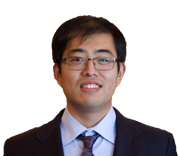Sharing information about treatment outcomes can help physicians figure out the best course of treatment for people with similar cancers. But sharing information between institutions, while simultaneously protecting patient privacy, is a daunting challenge.
Now an expert in data privacy will be assisting researchers in Texas to share information between different institutions while protecting sensitive personal information from exposure. Xiaoqian Jiang was recruited in 2018 to The University of Texas Health Sciences Center at Houston from the University of California, San Diego, with the help of a Recruitment of Rising Stars Award from CPRIT. He is the director of the Center for Health Security and Phenotyping at the School of Biomedical Informatics.
Read More
Sharing information about treatment outcomes can help physicians figure out the best course of treatment for people with similar cancers. But sharing information between institutions, while simultaneously protecting patient privacy, is a daunting challenge.
Now an expert in data privacy will be assisting researchers in Texas to share information between different institutions while protecting sensitive personal information from exposure. Xiaoqian Jiang was recruited in 2018 to The University of Texas Health Sciences Center at Houston from the University of California, San Diego, with the help of a Recruitment of Rising Stars Award from CPRIT. He is the director of the Center for Health Security and Phenotyping at the School of Biomedical Informatics.
Health data is unique because it is highly sensitive and contains confidential information, which makes it difficult to share a lot of details between sites in order to optimize treatment protocols.
Challenges include the fact that any one site may have only a few cases of cancers of the same type, and even these patients may respond differently to the same course of treatment. Even more problematic, any one patient may receive treatment at multiple institutions. This leads to data on optimal cancer treatments being fragmented or anecdotal, based on results from a few complete cases.
Jiang said even existing large databases have obvious flaws, such as one containing records of several million cancer patients. He notes that among these are more than 5,000 brain cancer patients, who within the first two weeks of being admitted to the hospital have received medications to treat blood clots and nausea. “I have a strong belief that these patients have received chemotherapy from another hospital,” before being transferred to hospitals associated with this database, he says, “even though I have no chemotherapy recorded in my database.”
Jiang is working on developing computer algorithms that allow institutions to share information but at the same time mask any individual’s identifying characteristics. He says that some data can be encrypted and then computed in encrypted form — this is computationally more expensive than computing un-encrypted data but prevents exposure of sensitive information to a third party. “There is some cost, but usability is high,” he says.
He is also working on using machine learning to comb through data to find patterns that could help physicians make better-informed decisions about the best course of treatment for their patients. “Machines are much better at finding patterns for humans to check,” he says, “so combining physician knowledge with machine-driven pattern mining will allow us to push the frontier of cancer treatment and prevention.”
Jiang says he was drawn to the Texas Medical Center because it’s such a well-renowned institution in a growing region. “I could quickly expand my connections more broadly to other institutions in close proximity,” he says. He notes that the School of Biomedical Informatics, as the only freestanding school of its kind and one of the largest in the nation, invites exciting potential collaborations.
“Overall it’s an exciting opportunity for me, and I see a lot of new opportunities for collaboration,” he says. “I have the bandwidth and the room to do this, which is very exciting for me.”
In addition to the CPRIT Award, Jiang also received a UT STARs Award.
Jiang received a bachelor of engineering degree from Shanghai Maritime University in China and a master’s degree in computer science from the University of Iowa. He completed his Ph.D. in computer science at Carnegie Mellon University before coming to UCSD first as a postdoctoral fellow in biomedical informatics in 2011, and then as an assistant professor starting in 2013. He received tenure there in 2017. He holds two patents for his work.
Read Less

